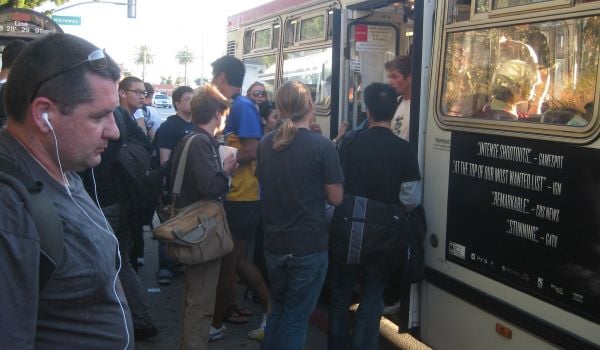On May 23, Georgetown University’s student newspaper, the Hoya, ran this headline:
Uber May Close in Response to DC Taxi Regulations
This past Sunday, the Hoya ran this headline:
UberX May Close in Response to DC Taxi Regulations
If you click through, you’ll see that it’s actually the same story, slightly updated to deal with news of the D.C. Taxicab Commission issuing regulations that would limit the use of low-cost cars in for-hire schemes. What’s happening here is that the D.C. Council had, in December, passed a bill that would open up the District to services like Uber. Meanwhile, UberX — the company’s low-cost service — launched just as the commission was wrapping up its rule-making.
So what the commission has done is make it more difficult for UberX to operate, though not Uber proper. The commission wants to study UberX and issue further guidance in the next few months, while Uber and its allies on the council want the issue settled now, though they’ll pass clarifying legislation if they have to. You’d be forgiven if you find that confusing, because it is super confusing.
Now, raising the alarm is what Uber does. Not for nothing does its CEO, Travis Kalanick, call his sending an email “the nuclear option.” And the situation is particularly acute in the District of Columbia. On a recent trip to D.C. (reporting on Uber, actually — stay tuned!), I attempted to take one cab from north Dupont to 14th Street, and when I asked the first driver to use a credit card, he simply frowned. When I asked a second cabbie, he hissed, “Just. Get. In.”
D.C.’s taxi market is an open one, with more than 110 companies, and it’s widely acknowledged as a mess. When I slammed the door on cab #2, I mashed the Uber button on my iPhone, and a gleaming black car pulled up in two minutes and eight seconds. I counted. It was pre-paid via the app, and when I opened the door, the driver — Bashir, according to the text from Uber — smiled in the rearview mirror and said, “Are you Nancy?”
That’s the sort of scenario that sets the context for Uber’s regulatory challenges in D.C. Still, you can find the state of cab service in Washington to be a national embarrassment and still think that some amount of regulation is necessary. New York City once let its cabs run wild, resulting in a mess for riders and drivers alike. The District is attempting to come to terms with what’s different about app-driven for-hire cars, and what the new model means for things like safety, price controls and accessibility.
It’s a fascinating place where the debate should be. At the moment, though, the conversation is on some lower plane where the Washington Post editorial board — Uber is good at visiting editorial boards — calls for the abolition of the Taxicab Commission, and the head of the commission says his reaction is one of “sadness” over the fact that “editorial writers don’t know what they’re talking about.”
This is hardly a sexy thing to say, but in many ways the dispute in D.C. is over timing. UberX launched on August 9, about a week before the commission issued its “Determinations and Findings” that restricted the ability of UberX to operate.
Of course, the commission has the ability to Google what’s happening in other cities, but UberX in D.C. will be different than in the cities where it’s already appeared. In these other places, UberX is really a ride sharing service, much like Lyft or Sidecar. You or I or anyone can can apply to be an UberX driver. In D.C., Uber opted to make UberX drivers commercially licensed and operate lower-cost cars, under the “traditional” model of for-hire black cars.
The dispute, then, is largely over whether the commission should get to decide that a Camry isn’t as good as a Lincoln town car. It likely shouldn’t, and the council will likely pass another bill making that plain. The churn goes on.
Why care? Well, the commission is limiting what Uber can do, right now, in the District, even if it’s not the existential threat the company makes it out to be. But the sky-is-falling approach is particularly striking because we’re otherwise on the cusp of figuring out new ways to use the networked public realm to make public policy. Uber has taken many of its organizing tactics from the fight over the digital copyright bills SOPA and PIPA. But that debate was rooted in relentless geeky discussion about how the Internet works. It was illuminating. Many people feel the right side won. Washington listened. And it gave a peek into what’s possible with policymaking that wasn’t possible before.
The Uber vs. Washington storyline that casts the company as a victim of mindless bureaucracy isn’t exactly bad for the company. And Uber indeed is getting caught up in red tape. But it’s also a company now valued in the billions. All that money could buy the freedom not to resort to a fear-driven approach to public policymaking. That’s how we made regulation in the old days, before we knew any better.

Nancy Scola is a Washington, DC-based journalist whose work tends to focus on the intersections of technology, politics, and public policy. Shortly after returning from Havana she started as a tech reporter at POLITICO.



_600_350_80_s_c1.jpg)












